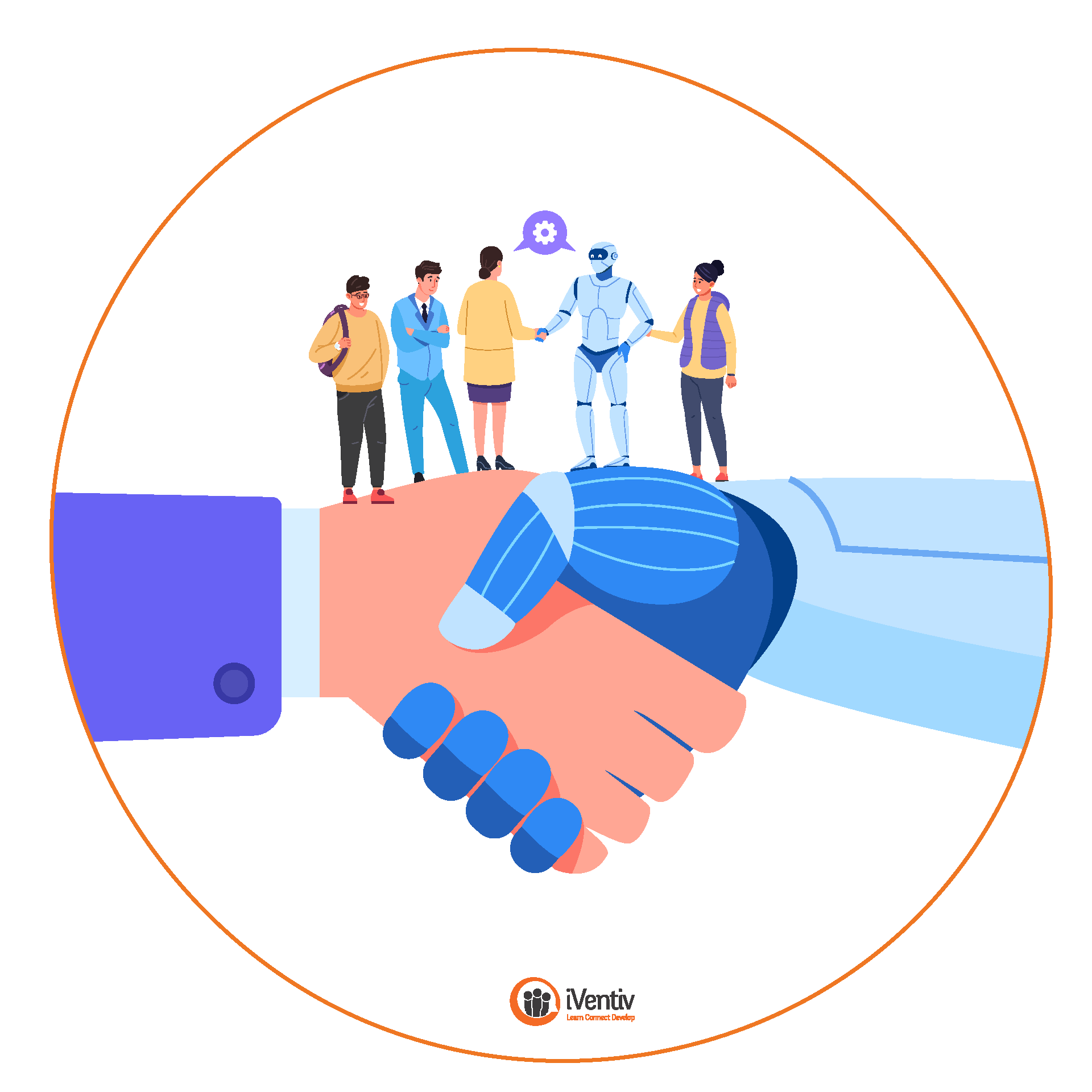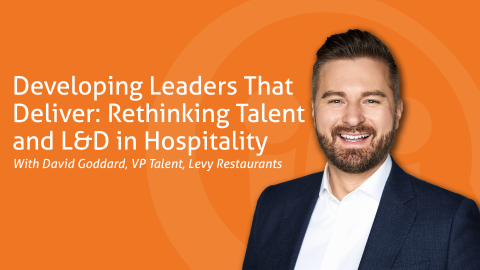Artificial Intelligence (AI) has emerged as a powerful force reshaping industries and revolutionising various aspects of our lives. One of the areas where AI is making a significant impact is Learning and Development (L&D).
As organisations strive to stay competitive in a rapidly changing world, many are turning to AI-powered solutions to enhance their training and education programs.
In this blog, we will explore the nature of AI in Learning and Development initiatives, the key concepts surrounding it, and the challenges L&D leaders are raising when it comes to implementation.

AI in the Workplace
AI is fundamentally reshaping how individuals and organisations approach learning, training, and skill development. Its integration into the world of L&D has been a reoccurring topic at iVentiv events across the board with 50% of participants stating that this is a priority for them heading into 2024.
From personalisation to enhanced content creation, to data-driven insights, and proactive planning for future needs, Heads of L&D want to know: what are the key concepts to consider? And what are the risks that come with it?
Personalised learning and planning for future needs in L&D
Unlike traditional one-size-fits-all approaches to development, AI-driven systems have the capacity to adapt learning experiences to the unique needs, preferences, and capabilities of individual learners, adhering to DEIB efforts organisation-wide. So it’s no wonder L&D leaders are eager to learn more.
L&D teams want to invest in AI because of its ability to make informed decisions about what content to present, how to present it, and when to present it through in-depth user analysis – as well as AI in L&D being a top priority, iVentiv surveys show 40% of you are focusing on people data as well.
Organisations are increasingly moving towards proactively designing training programs that equip employees with the necessary skills to excel in their roles and contribute to the company's strategic goals. When asked what their key priorities are for the months ahead, Heads of Learning repeatedly refer to ‘learning designed by data’ as a reoccurring theme.
AI's Hand in Enhanced Content Creation and Curation
Content creation and curation are fundamental aspects of any L&D initiative, and organisations see an opportunity with AI usher in a new era of efficiency and quality. Natural Language Processing (NLP) algorithms, for instance, are being used to help L&D teams to automate content creation, streamline content curation, and ensure that learning materials remain up to date.
Research by Deloitte suggests that 94% of companies using AI in L&D benefit from data-driven insights, which help in optimising training programs, identifying skill gaps, and improving employee performance.
In other words, learning teams hope that it can help learners to get the content they need, when they need it, in a way that best suits them, saving time and improving the overall quality of learning materials
Adapting to modern learning needs
For L&D Leaders, AI encourages a shift toward continuous learning and microlearning, in tune with the needs of today's fast-paced work environments. AI-driven platforms can recommend microlearning content based on an individual's performance, development goals, and role within the organisation.
AI-driven recommendations can guide employees toward relevant experiences and social interactions that contribute to their skill development. According to Jamie Culican, ‘lifelong learning is no longer a luxury, but a necessity for adaptability in the rapidly changing world’ of AI. It’s no small wonder that L&D leaders want to invest in a targeted approach that will promote a culture of continuous learning.
The challenges of Working with AI in L&D
CLOs see benefits from AI for L&D teams and the future of work and learning as we know it, but there are also significant challenges. For instance, the lack of AI talent and reskilling struggles organisations are facing; the responsibility of leaders to manage change and mitigate risks that come along with it; and human biases that have made their way into the AI conscious.
So what do the experts say?
Lack of AI Expertise in L&D
One of the most significant challenges is the shortage of AI talent. KPMG research on generative AI suggests that 2.5% of tasks will be replaced by AI, effecting 40% of jobs but in most cases not replacing them. Skilled professionals who understand AI concepts, algorithms, and their practical applications are in high demand and L&D teams are under significant pressure to reskill their current workforce to adapt to the rate of change.
Change Management
In our new world of generative AI, business leaders face the difficult task of discerning how to implement the technology alongside their workforce and whether it will replace certain positions altogether.
Our data shows a Head of Talent from one of Europe’s biggest pharmaceuticals mention ‘uncertainty around how employees and leaders will adopt AI programs’ when talking about future challenges. Employees may resist AI implementation due to this fear of job displacement or the learning curve associated with new technologies.
To curb this, according to Forbes, ‘companies must develop a deeper understanding of their offerings and customer expectations’ in order to pinpoint where generative AI can ‘provide value and where human interactions are indispensable.’
Bias and Fairness in AI adoption
Eliminating bias from AI systems is an ongoing challenge, and organisations are working tirelessly to monitor and adjust AI models to ensure fairness and avoid discrimination. Without extensive testing and diverse teams, it is easy for unconscious biases to enter machine learning models.
How are L&D leaders tackling the issue?
- Go1 argue in an article on their website that L&D plays a crucial role in raising awareness around unconscious technological biases, and has a responsibility to ‘respond when these biases arise in eLearning technologies to foster a more inclusive and sustainable environment.’
- Olga Russakovsky, co-founder of the AI4ALL foundation, suggests that L&D teams can reduce unconscious technological biases by promoting diverse teams, ‘as diversity grows, the AI systems themselves will become less biased.’
How are organisations moving forward with AI?
Many organisations feel that AI-powered solutions are becoming essential tools for enhancing the skills and knowledge of their workforce. In that view, the adoption of AI in L&D is not just a trend but a strategic imperative for organisations looking to thrive in the knowledge-driven economy of the 21st Century.
By embracing AI-driven L&D initiatives, organisations believe that they can empower their employees with the skills they need to excel, adapt, and lead in the digital age. As AI continues to evolve, its potential to revolutionise learning and development will only grow, potentially ensuring that organisations are better equipped to navigate the challenges and opportunities that lie ahead.
- Deloitte | Becoming an AI-fueled Organisation | https://www2.deloitte.com/us/en/insights/focus/cognitive-technologies/st...)
- Jamie Culican | AI and the Future of Continuous Learning | https://www.linkedin.com/pulse/ai-future-continuous-learning-jamie-culican/)
- KPMG | Generative AI Survey | https://info.kpmg.us/news-perspectives/technology-innovation/kpmg-genera...)
- Forbes | Why Generative AI will Help and Not Hinder Human Connection | https://www.forbes.com/sites/forbestechcouncil/2023/10/06/why-generative...
- Go1 | Recognising Unconcious Biases in AI Technology | https://www.go1.com/blog/recognising-unconscious-biases-in-ld-technology
- Craig Smith | Dealing with Bias in Artificial Intelligence | https://www.nytimes.com/2019/11/19/technology/artificial-intelligence-bi...










